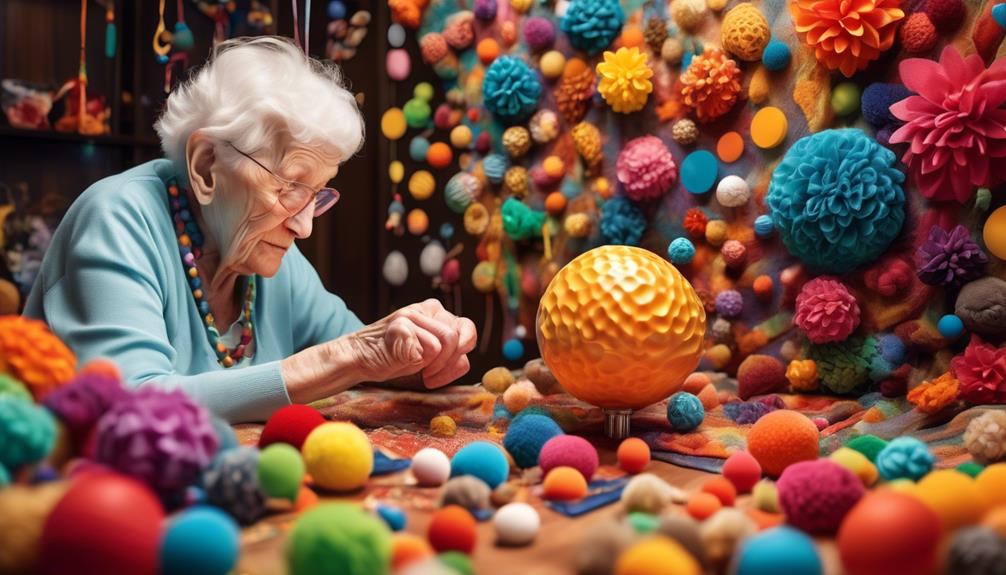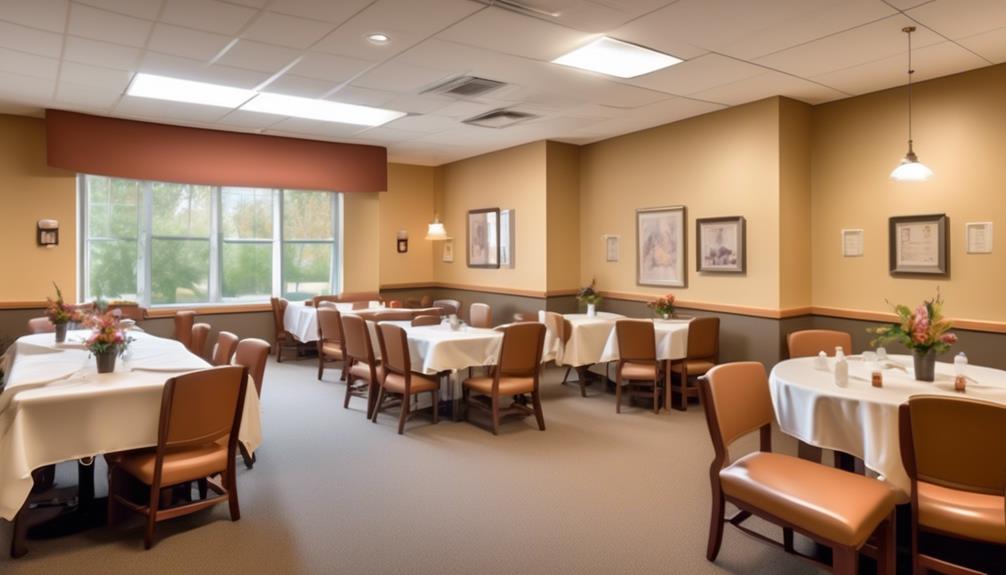Engaging in dementia-friendly activities while at home can significantly enhance the quality of life for those living with dementia.
Did you know that incorporating familiar scents into their routine can evoke powerful memories and emotions?
The olfactory sense is closely linked to memory and can be a powerful tool in creating meaningful experiences for individuals with dementia.
Discover how simple activities like baking cookies or using scented lotions can make a profound impact on their well-being and connection to the world around them.
Key Takeaways
- Outdoor activities provide sensory stimulation and nature connection for dementia patients at home.
- Personalized engagements based on unique interests enhance identity and purpose.
- Kitchen activities like baking cookies stimulate senses and evoke memories.
- Engaging in family holiday traditions offers comfort, connection, and positive emotions.
Outdoor Activities for Dementia Patients
Engaging in outdoor activities offers dementia patients sensory stimulation and a connection to nature, enhancing their well-being and reducing anxiety. Outdoor ventures like walking, gardening, or feeding birds can provide not only physical movement but also memorable experiences for individuals with dementia. Planting flowers or raking leaves in a garden setting can promote a sense of calmness and connection to the environment, positively impacting their quality of life. These nature-related tasks offer opportunities for engagement and sensory stimulation, which are vital for the overall well-being of dementia patients.
Moreover, spending time outdoors can help alleviate agitation and anxiety commonly experienced by individuals with dementia, leading to improved mood and emotional stability. Simple activities like watering plants or taking a leisurely nature walk can offer a soothing and refreshing experience. Collecting shells at the beach or enjoying a picnic can create positive and lasting memories, enriching the lives of those facing cognitive challenges. Outdoor activities play a crucial role in enhancing the holistic care and support provided to dementia patients, fostering moments of joy and connection with the natural world.
Indoor Activities for Dementia Patients

Indoor activities for dementia patients provide valuable opportunities for stimulating memories and promoting emotional well-being in a familiar and comforting environment. Engaging in these activities can help maintain cognitive skills and provide meaningful experiences for individuals with dementia.
Here are three indoor activities tailored to support dementia patients at home:
- Personal Care Activities: Offering a hand massage with lotion or gently brushing their hair can't only promote relaxation but also provide sensory stimulation, fostering a sense of comfort and well-being.
- Kitchen Activities: Involving dementia patients in baking cookies, setting the table, or making favorite meals can help them feel productive and engaged in familiar tasks, providing a sense of accomplishment and satisfaction.
- Holiday Tradition Activities: Participating in holiday traditions such as listening to festive music, baking holiday treats, or decorating a tree can evoke joyful memories and bring a sense of seasonal spirit to individuals with dementia, creating a warm and festive atmosphere at home.
Personalized Activities for Dementia Patients
Let's now shift our focus to personalized activities for dementia patients, tailoring engagements based on their unique interests and abilities to enhance their sense of identity and purpose.
When creating personalized activities for dementia patients, it's crucial to consider their individual interests and capabilities. By tailoring activities to the person's preferences, we can increase their engagement and enjoyment.
Engaging in familiar tasks and hobbies can help maintain a sense of identity and purpose for dementia patients. It's essential to observe the patient's responses closely and adjust activities accordingly to ensure they're beneficial and enjoyable.
Providing choices and empowering decision-making can enhance the overall experience for dementia patients, giving them a sense of control and autonomy.
Through personalized activities, we can create a meaningful and fulfilling environment that caters to the specific needs of each individual, promoting well-being and quality of life.
Kitchen Activities for Dementia Patients

Involving individuals with dementia in kitchen activities can provide a meaningful and engaging way to stimulate their senses and foster a sense of accomplishment.
Baking cookies together can engage their creativity and sense of smell, bringing back memories associated with familiar scents.
Setting the table for a meal or preparing a favorite snack not only helps in maintaining daily routines but also promotes independence and a structured environment.
Washing dishes and organizing the kitchen can contribute to a sense of achievement and pride, enhancing emotional well-being.
- Baking Cookies: Engage their creativity and evoke memories through familiar scents.
- Setting the Table: Maintain daily routines and foster independence.
- Kitchen Tasks: Washing dishes and organizing can provide a sense of accomplishment and structure.
Family Holiday Traditions for Dementia Patients
Engaging in cherished family holiday traditions holds a special significance for dementia patients, offering a comforting familiarity and a sense of connection to treasured memories. For dementia patients, participating in holiday activities like listening to festive music or engaging in baking activities can evoke positive emotions and strengthen bonds with family members. Decorating a tree, carving pumpkins, or coloring eggs can provide sensory stimulation and encourage creativity, offering a joyful and engaging experience. By incorporating holiday traditions such as making a pumpkin pie or baking holiday desserts, dementia patients can feel a sense of accomplishment and happiness.
Family holiday traditions also create opportunities for social interaction, laughter, and shared experiences, contributing to the overall well-being of dementia patients. These moments of togetherness can bring comfort and joy, fostering a sense of belonging and connection. As caregivers and family members, embracing these traditions with empathy and patience can create lasting memories and meaningful experiences for dementia patients during the holiday season.
Frequently Asked Questions
How Do You Keep a Dementia Person Busy?
To keep a dementia person busy, we focus on engaging activities like sensory stimulation, creative expression, reminiscence, fulfilling tasks, and technology-based experiences.
By incorporating these diverse activities, we can help them stay active, connected, and stimulated.
It's important to tailor these activities to their interests and abilities, promoting a sense of purpose and enjoyment in their daily lives.
With patience and understanding, we can create meaningful experiences that enhance their well-being.
What Are 3 Things Not to Say to Someone With Dementia?
We must remember to be mindful of our language when interacting with individuals with dementia. Avoid phrases that may cause frustration or embarrassment, such as invalidating their experiences or memories.
Refrain from correcting them or calling them difficult, as it can escalate negative emotions. It's important to approach conversations with empathy and understanding, choosing our words carefully to maintain a positive and supportive environment for those with dementia.
What Are the Indoor Activities for Adults With Dementia?
We understand the importance of engaging indoor activities for adults with dementia. Listening to music, looking at family photos, and enjoying afternoon tea can bring comfort and joy.
Watching a favorite sport, playing with play dough, and participating in personal care activities like hand massages promote stimulation and relaxation.
Kitchen tasks like baking, setting the table, and making snacks foster productivity.
Encouraging conversation and creativity through collages and photos is beneficial.
What Is the Number One Trigger for Dementia Behavior?
Changes in routine are the main trigger for dementia behavior. Sudden disruptions can cause confusion and agitation in patients. Consistent schedules help reduce anxiety and improve behavior.
Having a structured routine prevents challenging behaviors and enhances quality of life. Establishing a familiar schedule provides security and stability for those with dementia.
It's crucial to maintain routines to support individuals with dementia and create a comforting environment for them.
Conclusion
As we engage in activities with our loved ones living with dementia, we're planting seeds of joy and connection that will continue to bloom even in the face of memory loss.
Like a beautiful garden that requires nurturing and care, our time spent together is the sunlight and water that brings forth moments of laughter, comfort, and cherished memories.
Let's continue to sow these seeds of love and create a flourishing oasis of happiness for those we hold dear.








